Israel says it struck weapon hubs near Syrian-Lebanese border
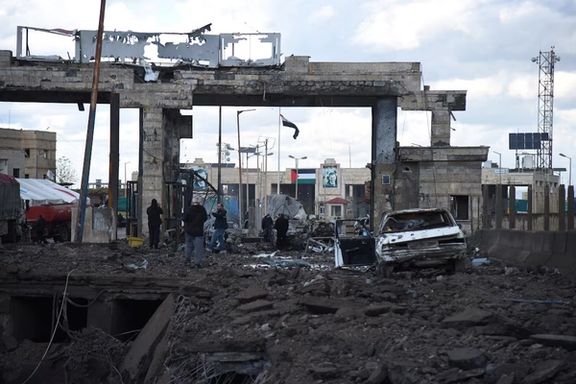
The Israeli military struck weapons transfer hubs and infrastructure near the Syrian-Lebanese border overnight, used by Iran-backed Hezbollah to transport arms, the military said Friday.

The Israeli military struck weapons transfer hubs and infrastructure near the Syrian-Lebanese border overnight, used by Iran-backed Hezbollah to transport arms, the military said Friday.
The Arida crossing, a vital link between Syria and northern Lebanon, was rendered inoperative by the strikes, according to Syrian state news agency SANA. Lebanon's transport minister, Ali Hamieh, also reported damage to the Jousieh crossing, which connects Syria to eastern Lebanon.
Both crossings are strategic entry points into Homs province, where anti-Assad rebel forces have recently gained ground.
Rebel forces, led by hardline Islamist factions, recently captured Aleppo, Syria's second-largest city, in a major blow to President Bashar al-Assad's government.
The advance builds on earlier successes in northern Syria, intensifying pressure on Assad and his allies.
In a significant development, Syrian army forces withdrew from the northern city of Hama as rebel fighters entered, citing the need to avoid urban combat and protect civilian lives, according to a military statement.
The Syrian civil war, sparked by Arab Spring protests in 2011, had largely subsided in recent years following substantial support for Assad’s forces from Iran and Hezbollah. However, a recent rebel resurgence has reignited hostilities.
Tehran has reinforced its backing of Assad by deploying a senior commander from the Islamic Revolutionary Guard Corps (IRGC) to bolster his forces.
Iran’s Foreign Minister Abbas Araghchi met with his Iraqi and Syrian counterparts in Baghdad on Friday to address the rapid advance of rebel forces in Syria.
In a video statement on Thursday, a Syrian rebel leader called on Iraq’s prime minister to prevent the Iran-backed Hashd al-Shaabi militia from intervening, warning that such involvement could further escalate regional tensions.
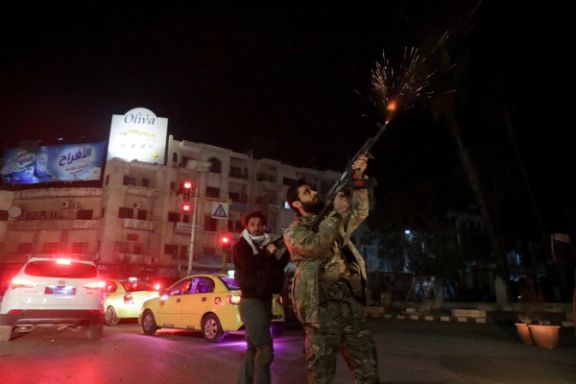
Iranian Foreign Minister Abbas Araghchi traveled to Baghdad on Friday for talks with his Iraqi and Syrian counterparts about the rapid advance of rebel forces in Syria.
In a bilateral meeting Iran and Iraq agreed to hold further discussions on Syria, aiming to coordinate support for its government and people and align political positions, Araghchi said Friday after meeting his Iraqi counterpart Fuad Hussein in Baghdad.
He added that Iran is fully prepared to assist Syria as needed.
Meanwhile, Araghchi confirmed the tripartite meeting will take place but shared no further updates.
Although the Iraqi government is not formally part of the alliance between the Islamic government in Tehran and Bashar al-Assad’s administration in Damascus, it is dominated by Shia Muslims with close relations to Tehran.
Anti-Assad forces, who launched a fierce offensive just a week earlier, captured the city of Hama on Thursday, marking a significant advance southward from their northern stronghold in Idlib and bringing them closer to threatening the Syrian capital, Damascus.
Syrian Foreign Minister Bassam Sabbagh arrived in Iraq earlier this week, ahead of Abbas Araghchi.
The visits come as Baghdad faces a critical decision: whether to intervene in Syria, allow Iran-backed militias to cross its border in significant numbers, or risk the collapse of Assad, an Alawite leader whose sect is linked to Shiism.
Iranian state media have provided limited details about the purpose of the tripartite meeting, stating only that it will focus on the crisis in Syria.
The challenges facing Assad, however, are primarily military rather than diplomatic.
For Iran, the stakes are even higher, with the potential loss of nearly all its influence in the Levant, where it has heavily invested in building armed groups and bases as part of a so-called “Shiite crescent” extending to the Mediterranean Sea.
Although Iran has framed its aim as part of a broader fight against Israel, the aftermath of the October 7 Hamas attack has significantly backfired, weakening Hezbollah in Lebanon—its main proxy force—and enabling the Syrian rebel offensive.
On Thursday, Mohammad Jolani, leader of the Syrian rebel group Hay’at Tahrir al-Sham (HTS), publicly urged the Iraqi government not to intervene. In response, a spokesperson for Iraq’s Hezbollah accused Jolani of serving Israeli interests, according to Tehran-based Tasnim News, which is affiliated with the Islamic Revolutionary Guard (IRGC).
HTS, with roots in al-Qaeda, is still regarded as an extremist Sunni movement. Iraqi Shiites fear its resurgence, drawing on memories of the Islamic State group’s (ISIS) occupation of large swaths of Iraq a decade ago.
A potential victory by anti-Assad forces in Syria would sever Iran’s land route to Hezbollah, which has faced significant losses under Israeli strikes since September, including substantial armaments supplied by Iran over the past three decades.
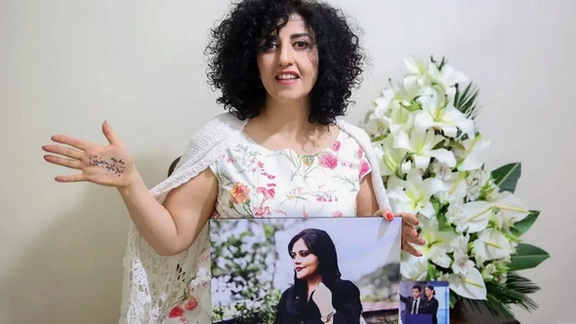
The United States on Thursday demanded Iran release Nobel Peace laureate Narges Mohammadi with no conditions, a day after her release for three weeks of medical leave.
"Her deteriorating health is a direct result of the abuses that she's endured at the hands of the Iranian regime," State Department spokesman Vedant Patel said in a press briefing on Thursday.
"We call again, just as we've done before, for the immediate and unconditional release of Narges and other political prisoners," he added.
Mohammadi, 52, has spent much of the last two decades in and out of prison. She is currently serving a 13-year sentence in Tehran's Evin prison.
Earlier in October, Mohammadi’s family accused Iran's security and judicial authorities of repeatedly blocking her transfer to hospital for an angiography procedure.
Her situation "continues to be deeply troubling and unfortunate, because she should have never been incarcerated in the first place," Patel said.
Mohammadi was filmed being taken off an ambulance on Wednesday, holding a picture of Mahsa Amini, the 22-year-old Iranian woman whose death in custody sparked widespread protests in 2022.
"Hello freedom! Woman Life Freedom! Freedom is our right," she shouted while seated on a stretcher.
She was awarded the Nobel peace prize in 2023 for her three-decade campaign for women's rights in Iran.
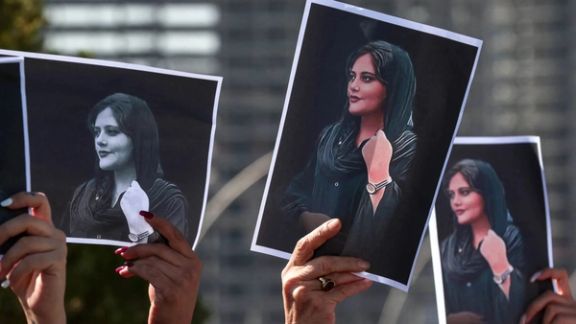
A new report from a US-based rights group drawing on hundreds of interviews over more than two years has documented Iran's systematic denial of accountability and legal redress for killings and other grave human rights abuses.
The Abdorrahman Boroumand Center for Human Rights (ABC) highlighted in its report released on Thursday the legal struggles of 16 victims' families who sought justice within the Islamic Republic's judicial system.
Based on over 300 interviews conducted between the fall of 2022 and November 2024, the report sheds light on their ongoing struggle.
The 2022 Woman, Life, Freedom protests were ignited by the death of Mahsa Amini in police custody and erupted in September 2022 across the country, resulting in at least 550 deaths, thousands of injuries and tens of thousands of arrests.
"Inside Iran, state obstructions prevent the families whose loves ones were killed in the Women, Life, Freedom uprising to seek justice, forcing them to live without closure," said Roya Boroumand, executive director and co-founder of Abdorrahman Boroumand Center.
Despite global outrage and two years of legal efforts, justice for those killed or injured during the crackdown remains out of reach, with many cases still unresolved and families facing continued harassment.
The report outlines several key findings, including the state's refusal to cooperate with independent investigations, the persistent harassment of victims' families, and the use of financial settlements and intimidation tactics to prevent legal action.
In the rare instances where legal action was taken, the report says trials were often deeply flawed, with the judiciary failing to identify perpetrators or prosecute them effectively.
Among the few convictions, the case of Mehran Samak stands out. Samak was shot dead by security forces in Bandar Anzali during a protest in November 2022.
Despite the initial dismissal of the police chief involved, the case has been a rare example of accountability, with a military court sentencing the officer to death for premeditated murder. However, appeals and ongoing delays mean the sentence has yet to be carried out.
Similarly, the case of Mohammad Jameh Bozorg, killed during a raid on his home by security forces, led to the conviction of a member of Iran's Islamic Revolutionary Guard Corps. The report noted that even in these rare successes, authorities have engaged in obstruction, attempting to coerce victims’ families into silence or accepting financial compensation in exchange for dropping charges.
The report also added that families of those killed in the protests, including Mahsa Amini, Mohammad Arian Khoshgovar, and Kian Pirfalak, continue to face pressure.
In many cases, investigations into these deaths have either been closed or suspended without proper judicial follow-up. The report reveals that numerous families, including the Khoshgovar family, were offered "blood money" in exchange for dropping their cases, with some facing threats of unspecficied repercussions.
In another instance, during the "Bloody Friday" massacre case in Zahedan, judicial officials urged victims' families to accept blood money as compensation. However, the families rejected the offer, demanding the harshest punishment for the perpetrators and those who ordered the violence.
Internationally, the United Nations’ Independent Fact-Finding Mission on the Islamic Republic of Iran (FFMI) has sought to address these violations, highlighting the use of state violence, including unlawful killings, torture and sexual violence.
However, the Iranian government has dismissed the FFMI's findings, saying the report lacks credibility and legal standing, labeling it a politically motivated attack.
“By establishing an Independent Fact-Finding Mission on Iran, the international community took an essential step towards achieving accountability. Now it must act decisively to ensure that the Mission's recommendations for justice and reparations are implemented outside Iran," Boroumand added.
"By doing so, it will send an unequivocal message to Iran: Impunity for repressing protesters will no longer be tolerated.”
The Boroumand Center report emphasized that despite the setbacks, families and supporters remain determined to win justice and urged global solidarity to back those who continue to fight for accountability and reparations.
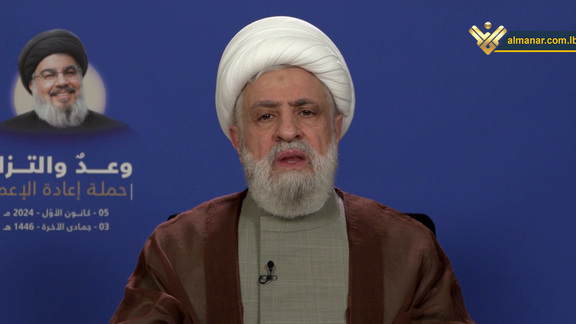
Iran has funded the bulk of aid distributed to Lebanese families affected by a 14-month war between Israel and the country's Tehran-backed militia Hezbollah, the group's leader said, even as an economic crisis festers inside Iran.
A total of $77 million has been earmarked for almost a quarter of a million families, Naeem Qassem said in a televised speech on Thursday, adding that most of the funds came from Iran.
Families whose primary homes have been destroyed would eventually be paid $8,000 as compensation and between $4,000 to $6,000 for temporary accommodation for a year, depending on where they live.
"We thank the Islamic Republic of Iran, led by Imam Khamenei, the state, the people, and the blessed Islamic Revolutionary Guard Corps for providing this generous support in the displacement process," Qassem said.
Hezbollah was formed by the IRGC in 1982 and joined a war between Israel and Hamas a day after the Palestinian group launched the deadliest attack on the Jewish state in its history on October 7 2023.
Israel escalated the conflict in September, killing Hezbollah's leader Hassan Nasrallah after maiming hundreds of mid- and senior-level commanders by planting explosives in their communications devices.
Hundreds of air strikes pounded Hezbollah's centers of popular support mostly within majority Shi'ite areas of south Beirut and the country's south. Lebanese authorities say more than 3,960 people were killed, many of them civilians.
Meanwhile in Iran, decades of US-led sanctions and economic mismanagement have sent costs soaring while the currency has plumbed multi-decade lows.
Labor and cost of living protests swept Iran earlier this month as nurses, emergency personnel, retirees, and public transportation drivers picketed, expressing dissatisfaction with government economic and social policies.
Iran’s president Masoud Pezeshkian warned of depleting foreign currency reserves in a televised address on Monday and earlier warned of an "economic abyss" due to shortages of water, electricity, and natural gas.
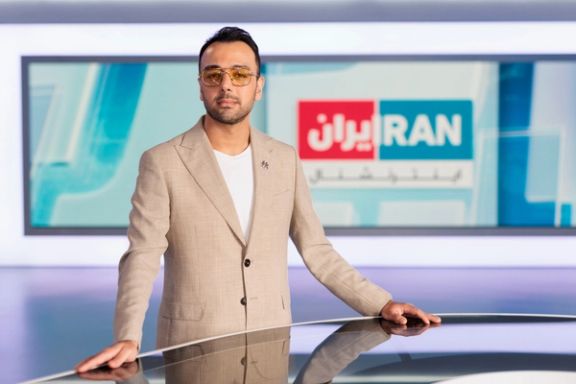
Romania arrested and charged two nationals over the stabbing of prominent Iran International presenter Pouria Zeraati in London earlier this year, Britain's Crown Prosecution Service said on Thursday, but authorities stopped short of linking Tehran to the attack.
"Following a review of the evidence provided by the Metropolitan Police Service’s Counter Terrorism Command, we have authorised charges against two Romanian nationals," the CPS said in a statement.
Iran has previously denied involvement in the case and any alleged attempts to attack dissidents abroad.
The men named as Nandito Badea, 19 and George Stana, 23 were arrested on Wednesday and have appeared in a Romanian court on charges of "wounding with intent to cause grievous bodily harm and wounding".
They now face extradition to the UK.
"The charges relate to an attack on a journalist in Wimbledon on the afternoon of Friday, 29 March 2024," the CPS added.
Zeraati was stabbed outside his home in Wimbledon, south London, on that date and sustained leg injuries.
"We won’t be commenting further on the investigation and would urge others not to speculate about the case, given criminal proceedings are now pending,” the London Metropolitan Police's acting counter terrorism commander Helen Flanagan said.
Iran International spokesperson Adam Baillie welcomed the developments.
"We’re happy for Pouria, who suffered the attack, and we’re delighted that the UK police investigation into the attack has progressed to this stage."
"It is reassuring for our journalists, as for others in organisations under similar threat," Baillie added. "We see in this the commitment of the UK to fight transnational repression in Britain.”
US and British law enforcement agencies have previously accused Tehran of recruiting criminals and gang members to attack dissidents abroad.
“We’re not dealing with the usual suspects,” Matt Jukes, head of counterterrorism policing in the UK, was quoted as saying in a Washington Post article in September.
“What we’ve got is a hostile state actor that sees the battlefield as being without borders, and individuals in London are as legitimate as targets as if they were in Iran.”
US federal indictments last year accused three individuals allegedly linked to an Eastern European mafia group of plotting to assassinate Iranian-American journalist and activist Masih Alinejad at the request of Iranian authorities.